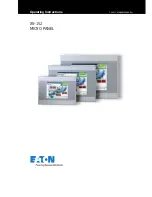
New units include data service which will require a renewal one year after
activation. Expected battery life is 2+ years and no other hardware maintenance
should be necessary.
If using the mapping feature on IRROcloud, note the exact location where the
device
is located so that you can input the latitude and longitude coordinates.
Sensor Installation
WATERMARK (200SS - Green Wires)
Conditioning
If time permits, conditioning the sensors before installation will provide the most
accurate results immediately.
Avoid soaking for extended period of time.
Without
conditioning, a few irrigation cycles will be needed before accurate response.
To condition sensors:
-Soak for 30 minutes
partially submerged and
let dry overnight
-Soak again for 30 minutes in the morning, let dry through the day
-Soak the sensors overnight, remove in the morning.
-Always install sensors wet.
Installation
Sensors must be installed in the root zone either vertically or up to a 45° angle.
Using a 7/8" (22 mm) diameter bar (or 1/2" IPS pipe) or an IRROMETER Coring
Tool or Slide Hammer Tool, make a hole to the desired depth. With hard or rocky
soil, a larger hole can be made with a soil auger. Fill the bottom of the hole with a
mud slurry made from native soil, then push the sensor down into the slurry. This
process will ‘grout’ the sensor to the soil for maximum contact. Backfill the rest of
the hole with the remaining mix.
(visit
www.irrometer.com
for installation videos)
Before installation, the sensor can be attached to a 1/2" class 315 PVC (thin wall
SDR 13.5) or 3/4" CPVC (SDR 11) pipe with an PVC to ABS cement. The pipe
becomes a conduit to protect the sensor wires and also helps to install and
remove the sensor, if desired. Cap the top of the pipe to prevent water having
access to the sensor through the pipe. A small hole should be drilled at the bottom
of the pipe
just above the senso
r,
to allow water to drain away if it becomes
trapped in the pipe. (visit
www.irrometer.com
for pipe assembly instructions)
Soil Temperature (200TS, Red Wires)
The Soil Temperature sensor should be installed in at a depth representing an
average of the upper two WATERMARK depths. All WATERMARK sensor readings
will be compensated by this sensor if connected, for better accuracy.
Bore a 1/2" (13 mm) or larger diameter hole in the soil and insert the temperature
sensor. Backfill the hole.
p3






















